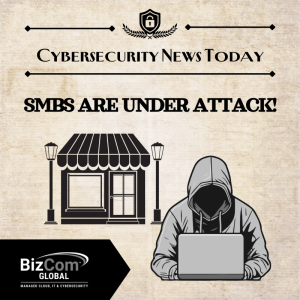
If you think your business is too small to be targeted by hackers, think again.
Cyberattacks are hitting small and medium-sized businesses (SMBs) harder than ever and the damage they cause can be devastating—financially, operationally, and emotionally.
Why? Because today’s cybercriminals know that many SMBs lack the tools, time, and staff to properly defend themselves. They’re seen as “low-hanging fruit” — often holding valuable data (customer info, payment details, relationships with larger vendors) without the advanced defenses of larger corporations.
Here are a few recent examples showing just how vulnerable SMBs can be, regardless of industry, size, or sophistication.
G&J Pepsi: A Bottling Company Caught in the Crossfire
You wouldn’t expect a bottling company to be the target of a high-profile cyberattack — but that’s exactly what happened to G&J Pepsi, based in Ohio. In a targeted Conti ransomware attack, a well-known group of Russian cybercriminals took aim at the company’s systems.
G&J Pepsi didn’t end up paying the ransom (thankfully), but the ordeal still cost them around $25,000 and forced their IT team to work around the clock for weeks. It’s a clear reminder that no matter how “non-tech” your business might seem, you’re still at risk.
Takeaway: Even if your business isn’t in tech, it can still be targeted — especially if you rely on digital systems for operations, scheduling, or distribution.
Read the full article here.
Brillies: A Small Online Store, Taken Down by a DDoS
Brillies, an online shop selling vintage sunglasses, was doing great — until it was hit by a series of distributed denial-of-service (DDoS) attacks in June 2021. Owner Kaila Uli tried everything: rebuilding the site, changing URLs, and strengthening security. But the attacks didn’t stop.
By early 2022, she had no choice but to shut the business down. To this day, she doesn’t know who attacked her or why. Her story is a tough example of how cyberattacks can hit any business, for any reason — or no reason at all.
Takeaway: Many cyberattacks are automated or opportunistic — they don’t need a reason. If your systems are vulnerable, you’re a potential target.
Read the full article here.
OneBlood: Cyberattack Meets Hurricane Season
On July 29, 2024, just before Hurricane Debby hit Florida, OneBlood — a nonprofit blood supplier serving hospitals across the state — was hit with ransomware. Their digital systems went dark at the worst possible time.
Switching to manual processes during an emergency led to a statewide shortage of platelets and delays in surgeries and treatments. What began as a cyberattack became a public health crisis.
Takeaway: Cyberattacks don’t wait for a convenient time — and businesses without strong, tested continuity plans are especially at risk during chaotic or high-pressure situations.
Read the full article here.
Seattle Public Library: When Ransomware Shuts the Books
In July 2024, the Seattle Public Library was crippled by ransomware, forcing the shutdown of public computers, book checkouts, online holds, and internal staff systems.
It took two full months to restore functionality — and recovery efforts have cost hundreds of thousands of dollars. Like many public institutions, the library had limited IT resources and aging infrastructure.
Takeaway: Many SMBs and nonprofits assume they’re too small or “under the radar” to be attacked. But that’s exactly what makes them appealing targets.
Read the full article here.
Why Are SMBs Being Targeted More Often?
Cybercriminals have shifted tactics in recent years — focusing less on large corporations (which are better defended) and more on smaller businesses that often:
- Use outdated software or weak passwords
- Lack internal IT or cybersecurity staff
- Have valuable data but fewer defenses
- Can’t afford long downtime and are more likely to pay ransoms
This is not a scare tactic — it’s a wake-up call.
The Bottom Line: Cyber Threats Are Growing. Is Your Business Ready?
What all these stories have in common is simple: cyberattacks don’t just hit big companies anymore. Small and medium-sized businesses are being targeted more than ever — and often, they’re less prepared to respond.
You don’t need to have all the answers today. But you do need to start asking the right questions:
- What’s our plan if we get hit with ransomware?
- Are our backups tested and recoverable?
- Do we know what tools we’re using — and are they up to date?
- Who’s responsible for managing our security?
If you’re not sure how secure your business really is, now’s the time to find out — before your name becomes the next headline.
BizCom Global Can Help
At BizCom Global, we specialize in helping SMBs strengthen their cybersecurity without the cost of hiring in-house staff. We keep your systems up to date, monitor the latest threats, and make sure you’re protected from the kinds of attacks that can bring businesses to a halt.
The first step? A free 5 Pillar Business Technology Risk Assessment. It’s quick, easy, and gives you a clear picture of where your vulnerabilities are — and how to fix them.
[Sign up here] to get started.
Don’t wait for an attack to take action. Let’s protect your business — before it’s too late.



